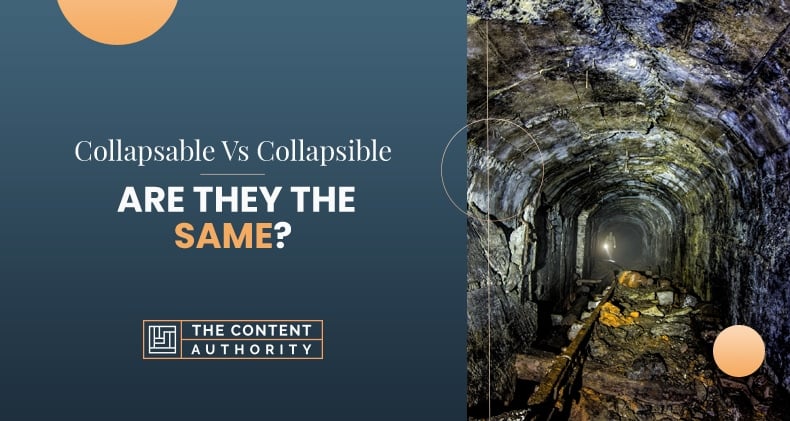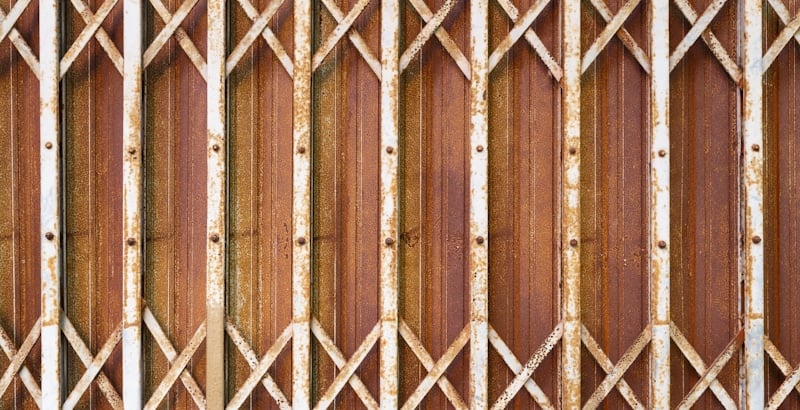Have you ever wondered what the difference is between “collapsible” and “collapsable”? Perhaps you are not very clear about which term is correct to use and which is not.
“Collapsable” is an adjective for something that can collapse, and “collapsible” is an adjective for something capable of collapsing. Both words have the same definitions. Although the most common writing is “collapsible.”
In this article, we will see the definition of both terms, examples of how to use them in sentences, their etymology, synonyms and antonyms, and their respective models to guide you when using them.
What Does “Collapsable” Mean?
“Collapsable” is an adjective used to define an object capable of collapsing for better transportation or storing it.
Examples:
- I want to buy one of those collapsable Christmas trees that you can put away quickly by folding it.
- My father was a camper, and he has a collapsible bed that you can fold for more accessible storage. It doesn’t take up space, and it fits perfectly in the corner of his closet.
- I bought my dog one of those collapsible plates to eat. This way, when we go for a walk to the park, it becomes much easier to give him water: I only have to unfold it, pour water from my bottle, and put it back when she is finished!
What Does “Collapsible” Mean?
“Collapsible” refers to the ability of an object to collapse itself for transport or storage.
Examples:
- My beach house is full of crabs. My daughter-in-law recommended that I buy collapsible traps for the crabs to transport them from the city to the beach easily.
- If the terrain on which your graduation will take place is flat, the best option is to get a collapsible stage to present the diplomas and speeches. We can install it the day before the event without damaging the grass, and it can save a lot of time and money.
- The apartments in New York are tiny, and you must properly use the space that exists. That is why we recommend buying our collapsible tables: they are durable, come in various colors, and you can store them when you are not using them.
As you could see, in both cases, the words “collapsible” and “collapsible” have the same meaning.
Etymology Of The Word “Collapsible”
“Collapsible” comes from the verb “collapse,” which in turn comes from the Latin word “collapsus,” which means “fallen together.” Therefore, when we say that an object is “collapsible,” we suggest that the item is capable of folding, bending, and transforming on purpose to reduce its size or change its usefulness.
Remember that in this case, we are talking about something intentionally made to change its original form. The other way you could use the word “collapse” refers to some catastrophe, such as the fall of a mountain or a building.
Synonyms Of The Word “Collapsible”
We already know that “collapsable” is another way of writing the word “collapsible” without altering its meaning. However, other terms can help us replace the expression, such as:
Foldable
“Foldable” is an adjective used to describe the quality of an object to be folded and stowed.
Examples:
- I have a foldable table hidden in my kitchen, so it is not bothering me when I am cooking, and I can take it out when I need to cut my vegetables.
- Make sure to lock the foldable table when you open it. I forgot to do it on my birthday, and the food ended up on the floor.
- In my house, I have a foldable sofa bed for visitors. Now I can chill about the space, and we can party until the next day!
- I need to find a foldable chair to go to the beach because every time I go, I have to sit on the sand, and everything gets dirty.
Foldaway
“Foldaway” refers to objects designed to be folded and stored when not needed or not in use.
Examples:
- Some of the plates I buy are in a foldaway version to facilitate their transport to activities and reduce their space.
- Have you ever heard of a foldaway fan? They’re small, compact, don’t take up much storage space, and are perfect for hot summer days! Where do you think they can sell these fans?
- I was looking at videos of people making foldaway tables on the internet, and it made me want to make my own. So I bought the wood, the nails, and the tools needed to make it. I think it was cheaper to buy a pre-made table.
- I have a foldaway desk, and I love it. It does not take up space, it is hidden all the time, and I can also protect the candy from my children so they do not find them.
Compress
“Compress” is a verb that means to make something smaller by force or pressure.
Examples:
- The sofa bed is compressed, therefore when it is opened, the legs will come out with a lot of pressure, and we must be careful not to hit ourselves with them.
- Compress the desk to close it. Sometimes it takes a little more force due to the time I have been using it, but I don’t think I can throw it away; I like it way too much!
- I can compress this into a handbag. It’s perfect for travel because it doesn’t take up much space and when it is unfolded, we can store a lot of clothes.
- I want to compress the size of my fan, so I will buy a folding one to avoid it being in the wrong place when I am not using it and so I can put it away when I do not need it.
Antonyms Of The Word “Collapsible”
If you are looking to refer to an object that cannot be folded, look at the following terms:
Disperse
“Disperse” is a verb that means distributing something in an area or to separate objects that are together.
Examples:
- I’m going to disperse all my plastic chairs on the patio to wash them and dry them in the sun, and I hope they don’t get toasted or break.
- We dispersed the parts of the vehicle to find out which was the one that was damaged, and now we have a screw left over. Do you think we need to call a mechanic?
- Please disperse the folding bed in the living room so my mother-in-law can sleep here tonight.
Outspread
“Outspread” is an adjective used to refer to something that is entirely spread.
Examples:
- Outspread the table because I am on my way with the food, and it is boiling.
- She told me: “Outspread your wings and let yourself be carried away by the wind.”
- When I see all of my home furnishings outspread, I realize what a mess I have here.
Open
“Open” is a verb that refers to separating the moving parts of a body.
Examples:
- Would you mind opening the chairs when we get to the beach? If you do it now, we will waste more time.
- If I wanted to open the table, I would have done it myself.
- The last time I opened the sofa bed, a bug came out of there. Since that day, that sofa bed has always been folded.
Conclusion
The terms “collapsible” and “collapsable” mean the same thing and are correct when used.
If you are going to use a synonym or antonym, make sure they make sense in the context you want to establish because although they have similar meanings, they may completely change the direction of a sentence.
Shawn Manaher is the founder and CEO of The Content Authority. He’s one part content manager, one part writing ninja organizer, and two parts leader of top content creators. You don’t even want to know what he calls pancakes.



